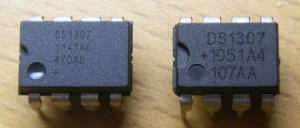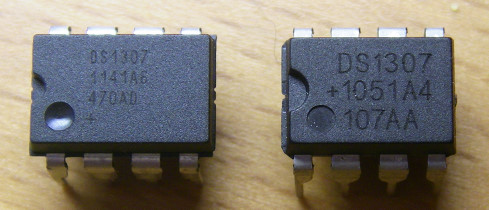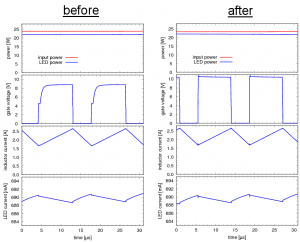My latest post was about differences within legitimate versions of the same integrated circuit from different manufacturers, today I’d like to write about experiences with supposedly counterfeit components.
It has been in the media that the electronic component market is fighting with counterfeit products from the far east. I myself encountered possible indications of such fake copies of high-quality capacitors in a consulting job for a big Swedish company last year, but nothing was proven then, it was just a suspicion combined with poor circuit design from the side of the company.
Earlier this year I have purchased quite a few electronic components from Chinese sellers on eBay. Unlike many European distributors (Elfa, Conrad, Pollin, Reichelt, Digikey, Farnell, RS, Electrokit) these sellers offer a wide range of recent electronic components at small quantities, hazzle-free and without unreasonably high shipment costs. I don’t know where the components in question come from, and I choose to not care for my private projects.
In general I have made very good experiences, the delivery time to Sweden is generally in the order of 2 weeks – and if you are not in a hurry, this is ok.
Continuing to play around with microcontrollers, and at the same time preparing lectures and projects for a course at Uppsala University I ordered a couple of real-time clock chips DS1307. Controlled via the serial I2C interface, these chips are supposedly easy to connect to an Atmel AVR microcontroller.
However, it didn’t work for me at all. After a couple of successful read and write accesses the I2C bus became blocked, some of the DS1307 chips which I tested became even hot, and all of them refused to work at all in subsequent tries.
I started to doubt myself, read the datasheet of the AVR controller, the datasheet of the DS1307 chip, googled the internet, looked up the I2C specifications, even programmed my very own bit-banging I2C routines – no success.
Sources on the internet pointed out the importance of the correct impedance of the 32.768 kHz quartz attached to the real-time chip – mine of course also came via eBay, unspecified directly from some garage sale in China, but I doubted that it should affect the function of the I2C bus.
Later in spring I approached representatives from Maxim on the Scandinavian Electronics Fair in Stockholm. They were kind enough to send me some samples of genuine DS1307 chips for testing and teaching.
As you can see from the picture, the genuine DS1307 chips look different from the ones I got from China! I even ordered them (at roughly no cost at all) from different eBay sellers, but all of those looked the same.

And yes, the sample chips I got directly from Maxim seem to run without major problems – once in a while the I2C bus seems to get stuck even here, but the clock continues to run internally in the DS1307, nothing gets hot, even the pulse-output on the DS1307 stays active. On the other hand I have never managed to get the pulse output on the Chinese chips to work at all…
Lesson learned? Well I still buy electronics from Chinese sellers on eBay, but I do not trust any of them anymore…




I had the experience with lots of LM2596 DC/DC converter modules… they don’t even have the switching frequency at the one specified from datasheet, and forget about ratings (they would blow up at 1/3 of expected current) not even minimum safety (failure mode is shorting input-output)(*)
If we talk about built devices then it is even more exagerated, neglecing all EMI, CE, UL… rules being even dangerous.
I keep on buying but I just don’t trust them anymore.
(*)Not difficult to guess they are counterfeits: whole module being $1 including inductor, capacitors and diode vs $2 for original chip alone…
Would you please specify which DS1307 chip in your photo is the genuine chip and which is the suspect counterfeit.
I have had similar DS1307 issues. The chips I got from Tayda Electronics look like the one on the right in the photo and has issues with the square wave pin enabled.
The chips I got from Futurlec, which look like the one on the left in the photo work as expected.
In my case the left one was sent to me directly from Maxim. But I have also seen working examples of the right type…
I personally had never any problems with Tayda – it’s one of my preferred sources…
Thank you for the response.
Are you certain that you have seen working examples of the right type?
Here is a detailed description of the bug I am seeing. Try enabling the 32.768KHz square wave out using a pull-up resistor on that pin, and then polling date and time with the oscillator enabled and see if you get any bus errors or frequent NACKS where there should be ACKS.
This is my first issue with any parts I have purchased from Tayda, and there has been quite a bit, but these DS1307s I got from them work only as clocks. The output oscillator is worthless because when I enable it, it only funtions alone, but then if I try other DS1307 communications such as get or set date and time there are random bus errors. Often the chip loses its time as well with the oscillator running. With the oscillator disabled, there are no errors.
Other DS1307s I have that look like the one on the left, do not have this issue even if I poll continuously with the oscillator enabled.
I will likely continue to buy from Tayda, but just as a word of caution, I have on more than one ocassion tried to communicate with them and have never gotten a response.
Just another note. I always check the square wave from these through a transistor buffer. Even the chips that I have that work very well do not like seeing any capacitance on the square wave out pin- even from a high impedance scope probe.
Also if the square wave pin is left floating (no pullup resistor), there are no errors with the oscillator enabled, but of course the floating pin is not usable output.
I have tried pullup resistor values ranging from 2.2k to 10k. No effect on the issue with resistor changes.
I have also tried other crystals for use with the correct capacitive load that the DS1307 provides internally. No effect on the issue with crystal changes.
I believe these are buggy chips. Markings below.
Tayda part number A-254 advertised as Maxim chips.
DS1307
1438A4
+102BN
Actually I have one which looks like the right type running on a clock, generating a 1s interrupt using the output pin – no problem. I have never tried a 32kHz output on that pin though on either type…
The problems I had with the chips which I identified as counterfeit where that they would lock up the I2C bus and then get hot, very hot…
If you are using the 1Hz signal to trigger an update of a date/time read then the bug I am talking about might not happen. It is most noticeable when polling more often than 250ms with the 32KHz signal enabled. Not that I normally poll that often, but the errors should not happen when I do.
Locking up the I2C bus is likely due to your driver waiting for transmissions that fail to occur. I use code that times out when waiting for transmissions so it can never block and so it can report error status codes.
As far as the heating goes, I would say that is a sure sign of a bad chip.
From now on, I will only buy DS1307s from authorized Maxim distributors. The time I wasted diagnosing the issue wasn’t worth saving a few bucks- even if it is for a personal project.
The only positive outcome in all of this is I was forced to update my TWI driver to properly handle more obscure problems than it was capable of before.
Pingback: Counterfeit chips – again « GreenPhotons
Amazing, this is a useful web site.|